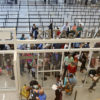A media briefing which occurred exactly two years ago today on Wednesday, March 11, 2020 included the first time that the World Health Organization officially declared that the 2019 Novel Coronavirus had reached pandemic disease status — interestingly and coincidentally, exactly six months after the 19th anniversary of the attacks of Tuesday, September 11, 2001, which means that now we will be reminded every six months of a substantially historic event which changed the world…
…but what have we learned over the past two years?
Two Years Ago Today Since The Pandemic Was Officially Declared

The 2019 Novel Coronavirus — which is also known as COVID-19 or 2019-nCoV or SARS-CoV-2 or HCoV-19 or severe acute respiratory syndrome coronavirus 2 or something like that — has wreaked havoc around the world. This article covers the latest statistics — along with commentary on what we learned over the past two years.
A Look at the Latest Statistics

The latest statistics are that at least 6,019,085 people — or slightly greater than 1.34 percent — have died of the minimum of 450,229,635 confirmed cases worldwide, according to this situation dashboard from the World Health Organization pertaining to the 2019 Novel Coronavirus…
…and at the same time, at least 6,032,429 people — or slightly less than 1.33 percent — have died of the minimum of 453,925,620 confirmed cases worldwide, according to this situation dashboard from Johns Hopkins University & Medicine pertaining to the 2019 Novel Coronavirus.
At the time this article was written, at least 961,620 people — or slightly greater than 1.21 percent — have died of the minimum of 79,248,406 confirmed cases in the United States, according to this situation dashboard from the Centers for Disease Control and Prevention pertaining to the 2019 Novel Coronavirus — and with an estimated population of 332,403,650 people, that means that slightly less than 0.29 percent of the population of the United States have died with it.
The population of the world is currently at approximately 7.9 billion people. Using the higher statistics from Johns Hopkins University & Medicine, that means that slightly less than 5.75 percent of the population have confirmed cases of 2019 Novel Coronavirus, with slightly greater than 0.075 percent of the population having died with it.
To this day, the aforementioned statistics are still debated: some people believe that the numbers are substantially greater than what was reported; while others believe that a percentage of the deaths were erroneously reported with the 2019 Novel Coronavirus as the cause and that the numbers are actually lower.
Masks
The mandate to wear masks aboard airplanes and other modes of transportation has been extended by one month through Monday, April 18, 2022, according to this public statement from the official Internet web site of the Transportation Security Administration of the United States:
At CDC’s recommendation, TSA will extend the security directive for mask use on public transportation and transportation hubs for one month, through April 18th.
During that time, CDC will work with government agencies to help inform a revised policy framework for when, and under what circumstances, masks should be required in the public transportation corridor. This revised framework will be based on the COVID-19 community levels, risk of new variants, national data, and the latest science. We will communicate any updates publicly if and/or when they change.
The problem is the mass confusion over whether masks actually work. Vacillating between being told to wear them, not to wear them, how to wear them, and which coverings for the nose and mouth were supposedly more effective at what seemed to be random instructions — and all the while, the differences were generally negligible.
Most mandates to wear masks indoors have basically been eliminated in the United States even though the 2019 Novel Coronavirus is still prevalent and the pandemic has not been officially declared to have ended. Why now and not two months ago, one year ago, or seven weeks from now? Are the mid-term elections in the United States later this fall one of the reasons why?
Meanwhile, discarded masks with who knows what germs and microbes are still being littered all over the landscape — but a harmless bottle of water still cannot be brought aboard an airplane. That sure seems logical.
…So What Have We Learned?

We have learned that some people will follow whatever a government entity tells them and do whatever they are instructed to do; while other people seem to defy whatever a government entity tells them and not do whatever they are instructed to do — and both sides acted like they will do anything to try to shut down anyone with an opposing opinion, thought, or question.
Both sides are dangerous, in my opinion. A free society should welcome all points of view and have a thoughtful discussion about them — even if they disagree — so that we may learn and move forward better in resolving issues as a society in general.
We have learned about the vast power which social media organizations have over discourse worldwide. They are private companies which can basically set any policies that they want — and they set out to delete any information which was against their policies or narratives. Along with the mainstream media and political entities of governments, they control much of the information, misinformation, and disinformation: what is allowed; and what is not permitted. I believe that is dangerous as well, which is another reason why I usually eschew most social media.
We have also learned that people who have no medical background think they have the right to tell other people who do not have a medical background to not discuss the 2019 Novel Coronavirus or the pandemic. Perhaps people with no cooking experience do not have the right to discuss food, no legal experience to discuss law, no political experience to discuss politics, and no experience in playing instruments to discuss music.
I completely disagree. My personal experience suggests that the people with the least experience in a topic are more objective about the questions they ask and the issues they raise — questions which those more familiar may overlook or not think about. History is filled with examples of this.
We have learned that lockdowns, quarantines, and isolation have generally not worked — not for the initial two weeks; and not for two years. In fact, they have contributed to psychological issues, physical health issues, and the increase in substance abuse, suicides, uprisings, and protests — not to mention the severe economical impact, supply chain issues, and labor shortages which have largely resulted from them.
We have learned that poor planning, money, greed, power, and political agendas and rhetoric have generally gotten in the way of truly helping society get past a global health emergency of which we were shockingly unprepared to face.
We have learned that whenever a crisis surfaces, a scapegoat appears; and in the case of the current 2019 Novel Coronavirus pandemic, that person is the one who chose not to be vaccinated — regardless of the reasons — and was blamed for virtually everything which went wrong over during the pandemic. At one point, people were blaming unvaccinated people who repeatedly tested negative for the 2019 Novel Coronavirus for spreading it. Even “following the science”, that is simply not possible to do.
We have learned how easy throwing the entire world in turmoil became — and so unnecessarily. The past two years became a great learning experiment from which someone who wanted to commit some sort of terrorism can now more easily do with the knowledge they now have — and the worst part is that whoever was responsible for starting or allowing this pandemic to occur in the first place will not even be punished or disciplined.
Final Boarding Call

This is not exactly an anniversary to which anyone was looking forward.
Viewpoints which have pertained to the current 2019 Novel Coronavirus pandemic have been vociferous and resulted in strongly sharp divisions within our society, which was not helped by the constantly changing information cited by so-called “experts” who did not exactly do the best job of guiding the public through this pandemic successfully — and that is an understatement.
The time to move on should have been long ago. Although we should always take reasonable efforts to prevent people from getting ill or dying, we have to accept the fact that everyone will eventually die from something — but now is as good a time as any to move on with living life.
…and I still stand by what I wrote in all of those articles — especially after seeing how the past two years have eventually unfolded and evolved.
May we all fully travel safely once again as soon as possible — and have fun doing what we enjoy.
All photographs ©2020 by Brian Cohen.

